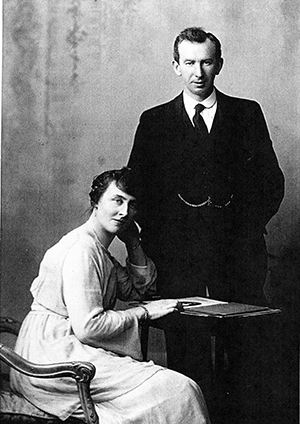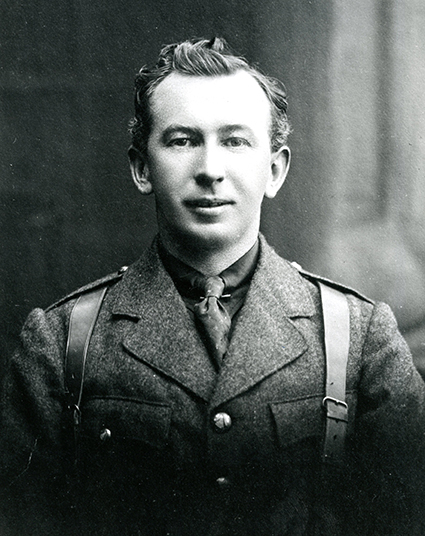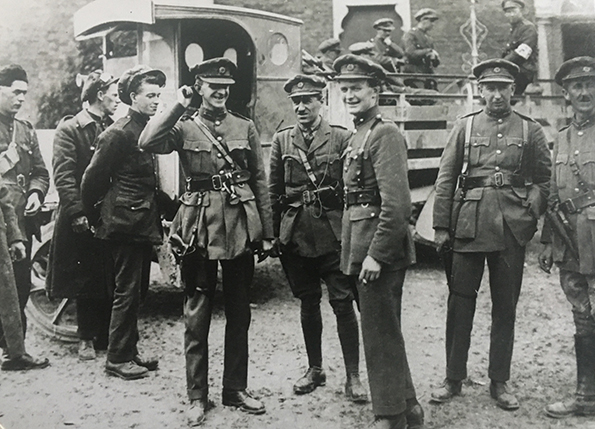‘A DETERMINED MAN’—MY GREAT-GRANDFATHER, FIONÁN LYNCH
Published in Features, Issue 1 (January/February 2022), Volume 30By Lasara Lynch
Fionán Lynch was born on 17 March 1889 in Waterville, Co. Kerry. Irish was his first language and he attended Rockwell College and Blackrock College. He planned to study medicine, but his father died suddenly and instead he went to teach Irish in a school in Swansea, Wales, where he founded a branch of the Gaelic League. In 1909 he returned to Ireland to train as a teacher at St Patrick’s College, Drumcondra, where he befriended Gearóid O’Sullivan, a cousin of Michael Collins.
JOINED THE IRISH VOLUNTEERS AND IRB
In November 1913 Fionán attended the inaugural meeting of the Irish Volunteers at the Rotunda and signed up immediately. He was assigned to ‘F’ Company, 1st Battalion, and later became its captain. Soon after, he was sworn into the Irish Republican Brotherhood (IRB) by Seán Mac Diarmada; Bulmer Hobson was the ‘Centre’ of Fionán’s IRB ‘Circle’.
Fionán commanded half of the 1st Battalion during an important rehearsal in January 1916 over the battleground area (Church Street and King Street near the Four Courts) later occupied by the battalion during Easter Week. By then he had been appointed a teacher in St Michan’s School on Church Street, and his knowledge of the area assisted greatly during the Rising. The Dublin Metropolitan Police followed Fionán during this period, as they frequently monitored Irish Volunteers and IRB members, and issued regular reports.
In early 1916 the Commissioners of National Education and the manager of St Michan’s School informed Fionán that if he did not sever his connections with the Irish Volunteers ‘his salary would be withdrawn’. Fionán reported to Seán Mac Diarmada, who referred him to Tom McDonagh, and he was advised to ‘lie low for the time being’. He and two other teachers, Thomas Ashe and Diarmuid O’Connell, formally severed their connections with the Irish Volunteers—until Easter Week 1916. While Fionán could not train with the Volunteers, he organised a squad for the various civil servants who could not be openly associated with them. At the time of the Rising, Fionán, Diarmuid O’Hegarty, Gearóid O’Sullivan and Seán Mac Diarmada were all living at 44 Mountjoy Street, which belonged to Fionán’s aunt, Myra M. McCarthy. Unbeknownst to her, weapons of the 1st Battalion were stored in the roof of the bathroom.
EASTER 1916

Above: Brigid Slattery and Fionán Lynch on their wedding day in November 1919. (Dermot Lynch)
While Fionán was not directly involved with the Volunteers in the spring of 1916, he was aware of the plans for the Rising. He scouted out the area that ‘F’ Company would occupy during the Rising and made all necessary preparations. On Holy Thursday he formally re-established himself as captain of ‘F’ Company. On Easter Saturday morning he was wakened by Seán Connolly (later killed on Easter Monday during the attack on Dublin Castle) with the news of Roger Casement’s arrest in Kerry. Mac Diarmada and Fionán hailed a taxi and visited Patrick Pearse in Rathfarnham, bringing him to Liberty Hall for conferences all day. On Easter Sunday Fionán and Gearóid O’Sullivan attended early Mass on Berkeley Road. Afterwards they read Eoin MacNeill’s countermanding order in the newspaper and brought it to the attention of Seán Mac Diarmada:
‘It was the first and only time that I saw Seán really angry and upset. I think, myself, that if he and the others who insisted on carrying on with the Rising had taken MacNeill more into their confidence there would have been no such proclamation from MacNeill.’
Meetings between the seven signatories of the Proclamation took place all day, guarded by ‘F’ Company. Fionán had
‘… a most unpleasant duty imposed on me at the time [which] was to place a guard over my own IRB Centre, Bulmer Hobson, who was detained by order of the Supreme Council for some days prior to the Rising. My instructions were that he was to be released when the Rising had started. As far as I know, the only reason for Hobson’s arrest was that he agreed with MacNeill that a Rising was impossible without German aid and, therefore, when the Aud failed to land any substantial share of arms he was opposed to the Rising going ahead at all at that time.’
The battalions were informed that the Rising would take place on Easter Monday instead.
During the Rising, Fionán was based in the Four Courts area. On Easter Monday morning the 1st Battalion mobilised in Blackhall Place and took up their allocated positions; Fionán was stationed in North King Street. It was quiet until Wednesday 26 April, when ‘F’ Company experienced very intense fighting. On Saturday they fell back to the Four Courts when an armoured car was brought to bear against the Volunteers. The fighting on North King Street was the fiercest that had occurred during the Rising. Indeed, a number of civilians were murdered in their homes by the British army (South Staffords). General Sir John Maxwell stated:
‘The allegations of brutality seem almost exclusively concerned with the fighting in North King St. … this was by far the worst fighting that occurred in the whole of Dublin. At first the troops, coming from one end of the street, were repulsed, and it was only when we made an attack from both ends that we succeeded, after twenty-four hours fighting, in capturing the street. The casualties were very heavy during this fighting …’
Fionán’s last action was on Saturday 29 April, near May Lane, where Seán Hurley was mortally wounded beside him. Fionán arranged for the nearby Capuchin priests to administer the last rites. Then he and his men withdrew over the rooftops and arrived in the Four Courts, where a battalion council was held. They were planning to continue fighting and to attack the South Staffords on Church Street, but the surrender order arrived from Patrick Pearse and they laid down their arms.
After the surrender, Fionán and many of his comrades were arrested. Incredibly, Floss O’Doherty (Fionán’s first cousin) and Mort O’Connell had fallen asleep in a quiet corner of the Four Courts overnight; when they awoke the following day, they found that the Rising was over and that all their comrades had been arrested. Changing their Volunteer uniforms for ‘civvies’, they were able to sneak past some British soldiers and went home, avoiding arrest and imprisonment.
Fionán and the others were marched to the Rotunda Rink, then on to Richmond Barracks and from there to Kilmainham Jail. During this march the watching crowd jeered at them and threw things at them:
‘On Sunday we were marched from Rotunda rink right through the city through Inchicore to the Richmond Barracks. From the laneways the women were up, shouting at the military to BAYONET them. The crowd were extremely hostile.’

Above: Fionán Lynch in Volunteer uniform soon after he joined in November 1914. (Dermot Lynch)
Fionán awaited trial in Kilmainham, while listening to the executions of his comrades, including Ned Daly and Seán Heuston, and his good friends Seán Mac Diarmada and Tom Clarke. He, too, was tried and sentenced to death, but his sentence was later commuted to ten years’ penal servitude. He was transferred to Mountjoy Prison and from there to Portland Prison, on the Isle of Wight. He was later transferred to Lewes Prison, and in June 1917 he was granted amnesty and released.
REPEATED ARRESTS AND IMPRISONMENTS
He returned home to Kerry, and was greeted by hundreds of people and speeches, including one given by Patrick Pearse’s mother. Local folklore described the fields around the Lynch family home in Kilmackerin, Co. Kerry, as being mobbed by the crowd. Fionán spent the next while delivering many speeches about the benefits of the republic. These, however, were considered seditious by the British and he was repeatedly arrested. One of his most noteworthy speeches was in Ardfert in August 1917, on the anniversary of the execution of Roger Casement. He wore his Volunteer uniform and made the speech in company with Thomas Ashe and Austin Stack. Afterwards, he got a lift back to Tralee in the horse and cart owned by a Volunteer called Tom Slattery, who had tried to save Casement from arrest in 1916 and had later been imprisoned at Frongach. Also in the cart was Tom’s daughter Brigid, who later married Fionán.
Fionán returned to Dublin and was rearrested after a short while. He was sent to Mountjoy Prison, where he and others began a hunger strike, seeking rights as political prisoners. Soon the prisoners were unable to walk and had to be physically carried to the force-feeding room. After one of Fionán’s force-feedings, he saw Thomas Ashe being brought out of his cell. Fionán called out, ‘Stick it, Tom boy’, and Ashe called back, ‘I’ll stick it, Fin’. This was the last time that Fionán spoke to his friend, as Ashe’s feeding tube was inserted incorrectly and the food was poured into his lungs. He died at the neighbouring Mater Hospital later the same day. After Ashe’s death, the other prisoners were given the full privileges of political prisoners. At Ashe’s inquest the barrister for the Crown described Fionán as ‘a determined man’. He was then transferred to Dundalk Jail, but was released soon after, in November 1917.
Fionán began organising the Volunteers in Donegal and Waterford, but was arrested once again in May 1918 and held in Strangeways Prison, Manchester. In the December 1918 general election, although still in jail, Fionán was elected as a Sinn Féin member for Kerry—his friend Michael Collins signed the nomination. The Sinn Féin members met in Dublin in January 1919 and constituted the first Dáil Éireann. Fionán missed the first meeting, as he was still in jail. He was released in August 1919 and helped some other prisoners to escape from Strangeways a couple of weeks later.
TREATY AND CIVIL WAR
Fionán was a member of the delegation that went to London to negotiate the Anglo-Irish Treaty. He supported the Treaty, like most IRB members, and viewed it as the most practical solution. He spoke forcibly at the Treaty debate at Earlsfort Terrace, supporting Collins and arguing that the Treaty compromise would give the country control of education, which would allow the State to guide subsequent generations and ensure full independence in time.
After ratification he was appointed Minister for Education in the Provisional Government. There was great conflict between fellow Irishmen who had fought together during the Rising and the subsequent War of Independence. Roughly half were pro-Treaty, believing that it could be used as a stepping-stone to further independence, while the other half were anti-Treaty. This conflict led to a brutal civil war in 1922–3. Fionán fought with the Free State army during the Civil War and was lieutenant-general in charge of County Kerry. Much of the Kerry population was anti-Treaty, so it was quite dangerous for Fionán when he travelled to his constituency. He was shot on one occasion, but a metal cigarette case saved his life. Lying in the bottom of a ditch and being shot at by his previous comrades-in-arms, like his friend Austin Stack, his aide made the dry comment, ‘It seems that your constituents are not happy with you, General’.
In August 1922, Fionán and Michael Collins were both travelling to their home counties. They journeyed together by car as far as Limerick, where they parted company. Fionán headed to Kerry and Michael Collins headed to Beal na mBláth, where he was ambushed and killed on 22 August. At the end of 1922, following the execution without trial of the Four Courts IRA members, a threat was published by the anti-Treaty IRA, warning that all pro-Treaty TDs, including Fionán, were targets for assassination.
After the end of the Civil War, the Cumann na nGaedheal government strove to create a working state. Fionán was first appointed Minister for Fisheries and then Minister for Lands and Fisheries. He continued to be threatened with assassination, and he and his family were provided with an armed guard until 1932. One of the first memories of my grandfather Thomas Lynch was of being taken to school in an armoured car!

Above: Fionán Lynch (second from right) with other National Army officers, including Eoin O’Duffy (fifth from right), during the Civil War in County Kerry, where Lynch was in command. (Dermot Lynch)
APPOINTED A CIRCUIT COURT JUDGE BY DE VALERA
In 1932 the Cumann na nGaedheal government was defeated by Fianna Fáil and Fionán was out of the government, although he continued as a TD until 1944. In 1937 he suffered a severe heart attack. Remarkably, Fianna Fáil decided not to contest his seat in the 1938 general election while he was recovering, and he was returned. Following the election he was elected leas cheann comhairle; he resigned owing to ill-health in 1939. In 1944 he was appointed as a Circuit Court judge (he had previously worked as a barrister) for Donegal and Sligo by Eamon de Valera. It was unheard-of that a Fianna Fáil taoiseach would appoint a Fine Gael politician to the courts, but Fionán was held in high regard by both sides.
In early 1966 the BBC recorded interviews with all surviving members of the Irish Volunteers who took part in the Rising, including Fionán. We have a copy of this incredible recording, in which someone who actually lived through all these amazing events that defined our nation can be heard describing them firsthand. A few months after this recording was made, in June 1966, Fionán died aged 77. Although he was offered a State funeral and burial in Glasnevin cemetery, his family felt that he would not have wanted an elaborate funeral and he was buried in Deansgrange cemetery.
Lasara Lynch is a student at Mount Anville Secondary School, Dublin.
Further reading
Bureau of Military History, witness statement (192) of Judge Fionán Lynch.
B. McAuliffe, M. McAuliffe & O. O’Shea (eds), Kerry 1916: histories and legacies of the Easter Rising—a centenary record (Listowel, 2016).
The closing date for submissions for the 2021–2 competition is 8 April 2022. Details here: https://www.gov.ie/en/publication/cf8d7-history-competition/.
















